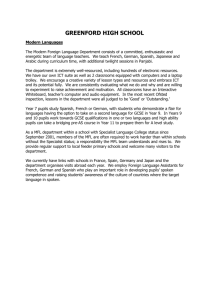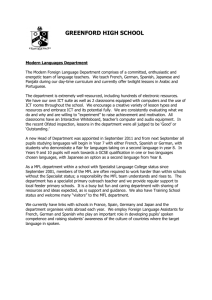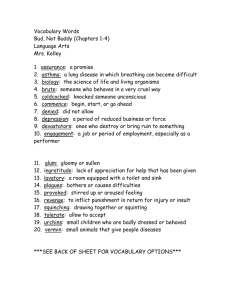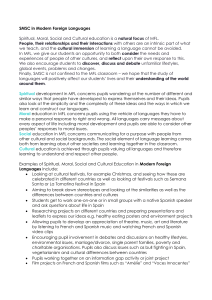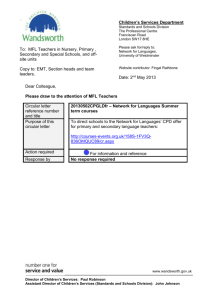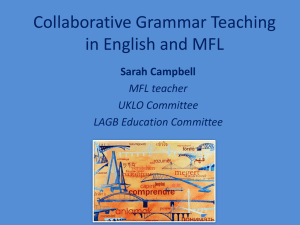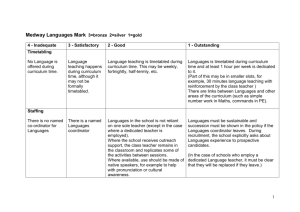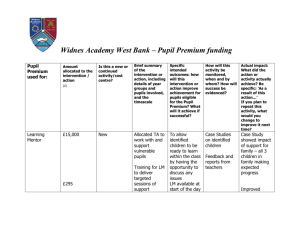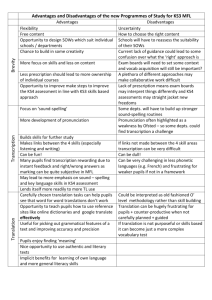Policy for Modern Foreign Languages
advertisement
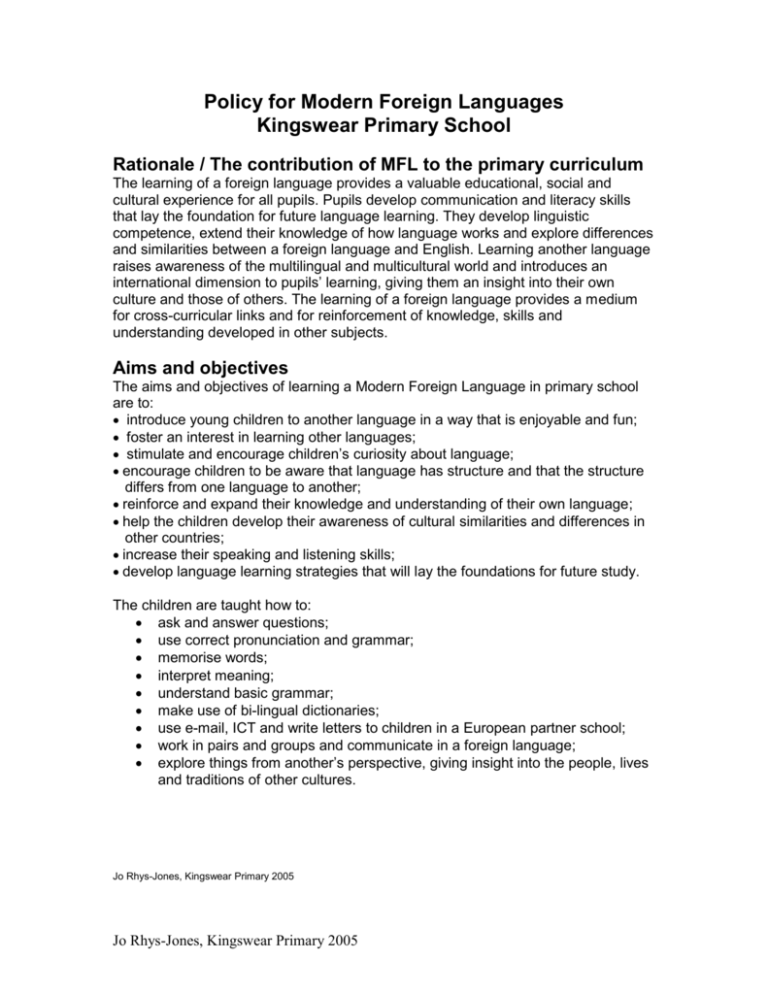
Policy for Modern Foreign Languages Kingswear Primary School Rationale / The contribution of MFL to the primary curriculum The learning of a foreign language provides a valuable educational, social and cultural experience for all pupils. Pupils develop communication and literacy skills that lay the foundation for future language learning. They develop linguistic competence, extend their knowledge of how language works and explore differences and similarities between a foreign language and English. Learning another language raises awareness of the multilingual and multicultural world and introduces an international dimension to pupils’ learning, giving them an insight into their own culture and those of others. The learning of a foreign language provides a medium for cross-curricular links and for reinforcement of knowledge, skills and understanding developed in other subjects. Aims and objectives The aims and objectives of learning a Modern Foreign Language in primary school are to: introduce young children to another language in a way that is enjoyable and fun; foster an interest in learning other languages; stimulate and encourage children’s curiosity about language; encourage children to be aware that language has structure and that the structure differs from one language to another; reinforce and expand their knowledge and understanding of their own language; help the children develop their awareness of cultural similarities and differences in other countries; increase their speaking and listening skills; develop language learning strategies that will lay the foundations for future study. The children are taught how to: ask and answer questions; use correct pronunciation and grammar; memorise words; interpret meaning; understand basic grammar; make use of bi-lingual dictionaries; use e-mail, ICT and write letters to children in a European partner school; work in pairs and groups and communicate in a foreign language; explore things from another’s perspective, giving insight into the people, lives and traditions of other cultures. Jo Rhys-Jones, Kingswear Primary 2005 Jo Rhys-Jones, Kingswear Primary 2005 Organisation In Kingswear Primary school, MFL (French) is taught to children in Reception and Key Stage 1 in fortnightly 30 minute lessons. The time is extended in Key Stage 2 so that children in Years 3 – 6 experience two 30-minute lessons per week followed by at least 3 further 5-minute sessions delivered later in the week. During the second half of the summer term the children of Key Stage 2 have the opportunity to study an alternative foreign language as a taster unit. In 2005 this was Spanish and based around the QCA unit – Hablo Español. In 2006 we learned German through a crosscurricular project with Science (Healthy Eating/Keeping Fit) based on the World Cup. This is a specialist model delivered by an MFL-trained Languages graduate who also happens to be a class teacher of KS2, and then followed up in short ‘bursts’ by the other classroom teachers. The ultimate aim is for all the staff in the school to teach some foreign language. This more integrated approach to the foreign language is being gradually developed within the curriculum, allowing staff to develop learning on a little-and-often basis. In addition to the distinct subject time allocation, we have found that there are opportunities on a daily basis to reinforce language work and for children to practise their newly acquired MFL skills within the classroom and across the curriculum. For example, registration numeracy mental warm-ups and class routines can and often are exploited to use the target foreign language. Flexible planning is of vital importance, especially in small schools such as this, and the resulting crosscurricular themes, building on the principles described in ‘Excellence and Enjoyment: a strategy for primary schools’ are also an ideal opportunity for further language learning. The school benefits from a new partnership having been established with École des Cascades, Creissels, France and the children exchange letters and emails on a regular basis. We had a visit from the school during spring 2006 and arranged a joint PE/activities day in Dartmouth with the whole of our key stage 2 class and 45 children from the French school which was very successful. The school has recently acquired SKYPE in order for staff and pupils of both schools to communicate verbally online. Jo Rhys-Jones, Kingswear Primary 2005 (updated 2007) Jo Rhys-Jones, Kingswear Primary 2005 The Scheme of Work This is the new scheme of work based loosely on Joan Dickie’s suggested 4-year rolling program, used for a single KS2 class of Years 3-6. Below is an overview of the entire 4year rolling program; Autumn In addition Greetings, Years 5 & name, age, 6; 1-12, colours (numbers 13-31, Phonics; a & time) iyou Spring In addition Days, Years 5 & 6; months, 13-31 (numbers 31-60, Phonics; e Money) éèê Summer In addition Weather, Years 5 & ABC, 6; Language portfolio (numbers 60-100) Phonics; j g rh Core Structure Years A/C Qu’est-ce que c’est? C’est un/une--- As-tu ? J’ai un/une--. Je n’ai pas de Tu aimes--? J’aime, je n’aime pas Years B/D Où est--? Il y a----- Tu veux? Je voudrais. C’est super! Qu’est-ce que tu aimes faire? J’aime + verb In my pencil case Local Area Family Café Clothes Pastimes & Hobbies In the classroom Animals Food Holidays Shopping Sport Basics Topics Year A Year B Year C Year D ‘Basics’ and ‘Core Structure’ are the same and repeated each year. Further progression is possible through the skills of the KS2 Framework and differentiation of the topics. On top of this topics may be switched and/or adapted to suit whole school cross-curricular themes. e.g. (This Spring term (Year A) the whole school cross-curricular theme is Science: Earth in Space, so the ‘Family’ topic will include an alien family and extended structure will involve describing the alien family, Days & Months word origins will be investigated to find links to planets, etc…) Topics are chosen from QCA units, available resources, partner school projects and planned School cross-curricular themes. E.g.; Body, Pets, Family, Food, Fruit, Clothes, Sports, Café, Shopping, Holidays, School, Christmas, Celebrations, Famous People. Wherever possible we prefer to teach in topics that complement the termly themes in which the rest of the curriculum is delivered. For example – ‘The Weather’ is an appropriate topic to teach in MFL to complement the termly topic ‘Rivers & Coasts’ and can be extended to include the Water Cycle. Each topic is then planned against the Framework objectives and linked in a cross-curricular manner to embed and reinforce language learning. The most important aspect is that the Basics and Core Structure are kept and then virtually any topic can be overlaid and differentiated. At present all children study French for the majority of the academic year. The second half of the summer term however is devoted to a ‘taster’ unit in an alternative foreign language – for example Spanish or German, but in the future other languages could be considered. We believe this additional language learning experience will reinforce recognition of language structure and serve as a boost to the enthusiasm and enjoyment of the children. Jo Rhys-Jones, Kingswear Primary 2005 (updated 2007) Jo Rhys-Jones, Kingswear Primary 2005 Teaching and learning styles A variety of techniques are used to encourage the children to have an active engagement with the Modern Foreign Language, including games, role play and action songs. Puppets and soft toys may be utilised to demonstrate and present the foreign language. Flashcards or other pictorial representations, even mime, are used to present new vocabulary, as this serves to demonstrate the foreign language without the need for translation. Tapes, CD’s and videos provide an additional model of the spoken language and contact with native speakers is encouraged wherever possible to involve the children in learning about culture. Contact with our partner school – École des Cascades and other link schools will help give the children a different perspective to that of the tourist or visitor simply passing through. Ideally class routines, praise, activities and games should be managed in the target foreign language. However staff and children are working towards this in gentle steps. We feel that the pupils need to feel secure in order to learn and it would be unsettling to expose them to a sudden torrent of unfamiliar foreign vocabulary. Therefore we are phasing in classroom instructions gradually and consistently, in response to what the children show they are ready for. Many games and activities do not require much verbal explanation at all and we have found that the children understand very quickly when you communicate through key phrases and mime. However we feel there is no harm in briefly outlining the rules of a game in English if an activity needs more explanation. Listening, responding and speaking skills (Oracy, Knowledge about Language, Intercultural Understanding and Language Learning Strategies) are emphasised in KS1 and then simple reading and writing skills (Literacy) introduced in KS2. A multisensory and kinaesthetic approach to teaching is used to address varied learning styles, i.e. there is a physical element to many of the games, rhymes and songs as this serves to reinforce memory. Particularly in Reception and Key Stage 1 QCA units may be based around familiar storybooks in French (such as Eric Carle’s ‘La Chenille qui fait des Trous’ – The Hungry Caterpillar) The storybook pictures and pupils’ familiarity with the classic children’s tale will help them “gist” the meaning of the few new words they have not yet encountered. Older children are happy to join in reading a “baby-ish” story because of the challenge and satisfaction of showing they can follow it in a foreign language. Most importantly, we strive to make lessons as enjoyable and ‘fun’ as possible so that the children develop a positive attitude to the learning of Modern Foreign Languages. Therefore we endeavour to develop children’s confidence through praise for any contribution they make, however tentative. EXAMPLE WORDS OF PRAISE IN FRENCH Très bien! Bravo! Formidable! - Very good! Well done! Brilliant! Jo Rhys-Jones, Kingswear Primary 2005 Jo Rhys-Jones, Kingswear Primary 2005 Assessment Children’s progress is assessed informally and continuously during the lessons by the teacher, evaluating progress against the KS2 MFL Framework. We consider it important that progression is measured and ensured through skill levels, not by endlessly growing lists of vocabulary. In addition every child is involved with self-assessment through the use of a European Language Portfolio or Language Passport which links into the Languages Ladder. KS2 MFL Framework Learning Objectives Oracy – listening and speaking Literacy – reading and writing Knowledge about Language – building on their knowledge of English/’mother tongue’ Intercultural Understanding and Contact Language Learning Strategies Pupils' self assessment In addition, children are expected to regularly complete a self-assessment sheet as key ‘milestones’ are passed in the course and at the end of each unit. These ‘can do’ statements are designed for individual pupils to complete but alternatively, pupils could work through the statements in pairs or small groups, checking to see which words and phrases are really familiar, and which they can nearly manage or have forgotten. The statements are closely linked to those of the grades required by the Languages Ladder, should the school choose possibly to join such an assessment scheme in the future. This system of formative assessment is designed to help both teacher and pupil keep track of any language that may need revisiting. It is important that pupils do not see the self-assessment sheets as tests. Children are given clear objective setting by their teachers and targets, in order to encourage responsibility and ownership of their learning. The self assessment sheets can also be included in the children’s ‘European Language Portfolios’, and passed on to their next class teacher, or to their secondary school. The children are encouraged to regularly update the store of materials in the portfolios so they can see for themselves the progress that they are making. The format also allows for children who may speak English as a second language or other languages at home to keep a record of this and have recognition of their achievements. Jo Rhys-Jones, Kingswear Primary 2005 (updated 2007) Jo Rhys-Jones, Kingswear Primary 2005 Progression: Example of topic adapted to ensure progression through MFL KS2 objectives for a mixed year class: MFL (French): Places in the Town. Suggested activities for teaching this theme within a mixed year group setting; It should be remembered that the ability and previous MFL learning of each child will have more bearing on the appropriate activity than their year group. Year 3 Year 4 Year 5 Year 6 Vocab – la poste, l’église, l’école, la gare, le port, le magasin, la banque, le jardin public… Flashcards – class/individuals repeat vocab aloud. (loud/soft fast/slow, Mexican wave syllables, with actions, Chinese whispers, child becomes teacher etc.) Digital photos of local areaMatch picture with word which is pre-printed / on prompt cards Vocab – (as before plus) Il y a un/une … Vocab -(as before plus) Pour aller à la / au …? Vocab -(as before plus) Allez tout droit, tournez à gauche / droite etc.… FlashcardsSame words but play Kim’s game, bingo (lotto), la bataille, Flashcards - make own on A4 to turn into card games to play / practise vocab. Snap, pairs, dominoes etc. Flashcards – Hold up and class must volunteer a sentence including that word. Digital photos of local areaMay use dictionary or memory to label photos using familiar vocabulary. Independent group/pair workMake and play snap cards using same vocabulary. Encourage pairs/groups to say words aloud as they play. Using songs –ask children to listen to song and respond when they hear a certain keyword (hold up picture of poste when hear it/ stand when hear the word gare etc.) Independent group/pair workProgress from snap to dominoes, linking image and word. Digital photos of local areaWrite own single word/short phrase caption. Add some of own photos and use dictionary to find new vocab. Complete cloze exercises. Independent group/pair workUse a video camera to produce a guide to the area with commentary in target language. Using songs –listen for keywords within a song, more than one perhaps, and encourage children to join in with the singing of keyword / stop song on the word for them to sing. Using songs –as children gain in confidence listening to the song, can they join in with longer sections? All of it possibly? Can they deduce the meaning of all of the lyrics? Text manipulationgroup words into masculine and feminine, encourage children to create vocabulary books and find possible patterns for le/la words. Devise ways with the children to remember – writing on pink/blue backgrounds? Text manipulation Print out all the words and cut up into cards. Race to make as many sentences as possible. Read them to each other. Who can make the longest/shortest sentence? Illustrate your favourite sentence. Text manipulation Using same word cards, extend the make a sentence challenge by asking students to make the sentences longer using adjectives they have collected in previous work and reminding them to make these agree with the noun. Digital photos of local areaTake own and produce a power point presentation /brochure / guide to local area to email to partner school / give to tourist office or local businesses. Independent group/pair workDevise and perform a sketch giving tourist directions. Give it a twist by giving prompts; tourist is in a great hurry / passer-by is very angry Using songs European Song Contest with groups taking responsibility for different verses and competing to perform. Particularly able/keen groups may want to try writing (guided) a verse following the pattern. Text manipulation Extend the make a sentence activity by examining the grammar – identify verbs, nouns, adverbs explicitly. Play with word order. Is it the same as in English? Or another language you know? Can statements easily be turned into questions? Jo Rhys-Jones, Kingswear Primary 2005 (updated 2007) Jo Rhys-Jones, Kingswear Primary 2005 Resources: Books; Storybooks La Chenille Qui Fait des Trous – Eric Carle Ours Brun – Eric Carle Catherine Cheater Year 3 & 4 story book packs Les trois petits cochons – puppet show book Textbooks/courses BBC Salut Serge (Fun with French) DVD/video packs and book. EarlyStart French 1 & 2 – Teaching File, cd-roms and website access MLG Ici On Parle Français (teacher’s own copy) EarlyStart Spanish Pack 1 Large Collins/Robert Bilingual dictionary Set of small bilingual dictionaries Catherine Cheater schemes of work – Years 3&4 and all linked resources (story books, Mon Ane DVD and Henri Des CD) ICT; Headphone/speakers to use SKYPE Digital camera BBC Website (Free) PowerPoint presentations (World Cup, Football numbers, Football body, Healthy/Unhealthy etc...) Teacher created resources in form of PowerPoint, Smart Notebooks, worksheets, word searches & puzzles and excel sheets saved in electronic format CD/DVD/Video; EarlyStart French (CD-rom pack) Salut Serge (Video/DVD Pack) Miscellaneous; Map of Europe Map of France / Spain Teacher-made paper resources – flashcards, worksheets, puzzles, word searches, laminated snap/domino sets, cue cards etc. (got) Continued membership of CILT Primary DIRECT (to be reviewed Jun 2005) Jo Rhys-Jones, Kingswear Primary 2005
